-
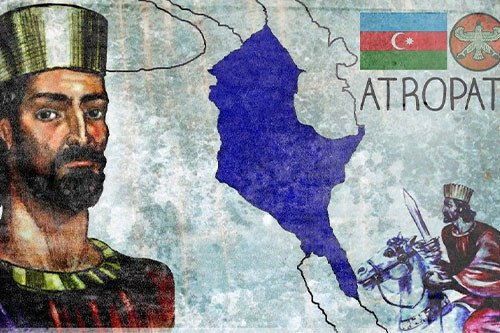 What Is the Origin of the Name "Azerbaijan"? 4 Theories Behind the Country's Name
901
1
What Is the Origin of the Name "Azerbaijan"? 4 Theories Behind the Country's Name
901
1
-
 Caspian Caviar: Discovering the Black Gold of Azerbaijan
254
0
Caspian Caviar: Discovering the Black Gold of Azerbaijan
254
0
-
 May 28 – Azerbaijan’s Independence Day: A Symbol of Pride and Freedom
493
0
May 28 – Azerbaijan’s Independence Day: A Symbol of Pride and Freedom
493
0
-
 Discover Nizami Street — Baku’s Cultural and Social Hub
492
1
Discover Nizami Street — Baku’s Cultural and Social Hub
492
1
-
 From Euro to Manat: How Azerbaijani Currency Tells the Story of Culture, History, and National Spirit
423
0
From Euro to Manat: How Azerbaijani Currency Tells the Story of Culture, History, and National Spirit
423
0

Things to Do in Baku: A City That Never Lets You Get Bored
Some cities welcome you with noise. Others with silence. But Baku welcomes you with something warmer — a sea breeze, the scent of black tea, and the slow rhythm of cobblestone footsteps. Once you take that first walk, you're no longer just a tourist — you’re part of the story. Wondering about the most exciting things to do in Baku? Let’s dive in. The better question is — where do you even begin?Begin your journey in Baku’s ancient core — the timeless Old Town. A stone labyrinth of narrow alleys, ancient walls, and centuries-old secrets. Here, you’ll meet the iconic Maiden Tower — part fortress, part mystery — and the majestic Shirvanshah Palace, echoing the days when Baku was a royal capital. The scent of saffron drifts from local kitchens, the sound of copperwork rings out from artisan shops, and you suddenly realize — this is the living history of Baku.But the city doesn’t live in the past. Step outside the old walls and you're in a place of glass and light. The futuristic Flame Towers rise in the distance like fire-shaped guardians of the skyline. From Highland Park, the panoramic view of Baku stretches from the Caspian Sea to the far hills. Take the funicular for a scenic descent into Baku’s vibrant center — the lively Baku Boulevard.The Boulevard is where the city comes to breathe. Couples stroll by the water, kids ride scooters, street musicians play softly. A few steps away, you’ll find “Mini Venice,” with its gondolas and calm canals — part kitsch, part magic. Sunsets here aren’t just pretty; they’re unforgettable. That’s the charm of exploring Baku — every corner brings something new.For a different kind of wonder, visit the Heydar Aliyev Center — a masterpiece by Zaha Hadid. Its fluid, wave-like design stuns from the outside, while inside it hosts exhibitions, concerts, and cultural gems. It’s where historical and modern Baku meet in elegant harmony.Naturally, no trip is truly fulfilling without experiencing the local cuisine. In Baku, dining is not just a meal — it’s an event. Try hot qutab with herbs, dolma wrapped in grape leaves, saffron-infused pilaf, and local cheeses. Pair everything with strong tea served in pear-shaped glasses, and don’t skip the rose jam. In a cozy teahouse with a sea view, time simply pauses.When night falls, the city glows in a new light. Buildings are wrapped in color, reflections shimmer on the water, and the vibe changes. On Nizami Street, cafes light up, music flows from every corner, and Baku feels almost like a stage. This is what evening Baku is all about — atmosphere, soul, and a gentle heartbeat that lingers long after you’ve gone home.Looking for something truly unique? Visit the Museum of Miniature Books — the smallest of its kind in the world. Or head to a local market like Taza Bazaar, where fresh herbs, dried fruits, saffron, and warm lavash tempt all your senses. These aren’t just souvenirs — they’re edible memories.And if you have time to go beyond the city? Take a short drive to Gobustan, where ancient petroglyphs and bubbling mud volcanoes offer a peek into a much older Azerbaijan. Alternatively, explore Yanar Dag — the legendary burning hillside where flames have flickered for ages.A City That Stays With YouThings to do in Baku? Simple: live it. Don’t just visit — taste, listen, wander. Bargain at the bazaar, sip tea slowly, watch the sun disappear behind the towers. Baku isn’t a place for checklists — it’s a place for memories. Come once, and part of you never really leaves.
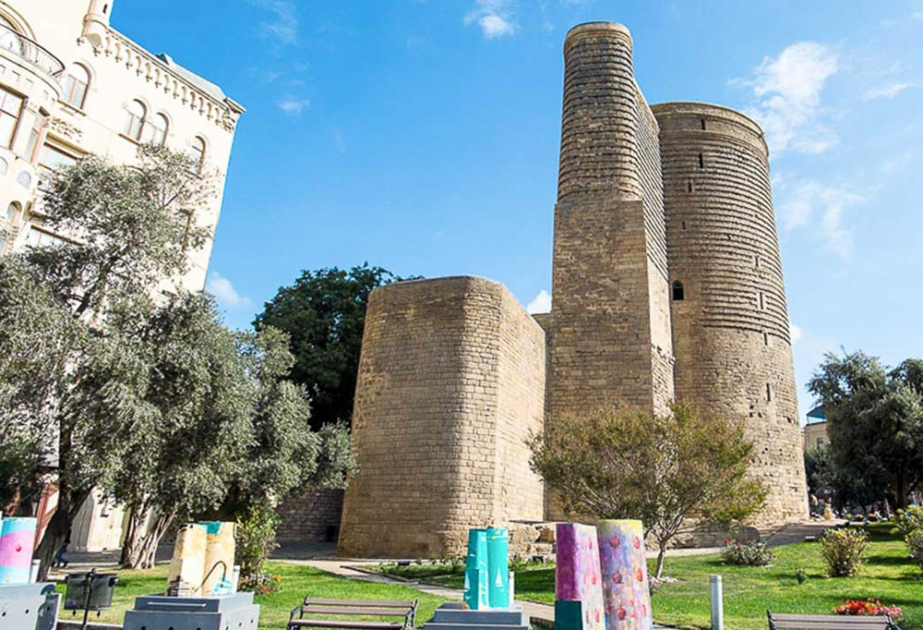
The Maiden Tower of Baku: Ancient Secrets and a Legend of Love
On the shore of the Caspian Sea, in the very heart of ancient Baku, stands a mysterious and imposing stone tower. Its weathered walls once heard the prayers of pagan priests, reflected the flickering flames of ritual fires, and perhaps witnessed the birth of those who were called the “children of the Sun.” This ancient structure is shrouded in mystery — no legend has ever fully explained its origin or purpose. Locals tell stories that the tower has seen broken hearts, a girl’s tears, and a tragic ending that echoes through the centuries.This is the Maiden Tower — one of the oldest and most enigmatic landmarks in Baku, located in the historic center of the city known as Icherisheher (Old City). It is widely regarded as a symbol of Baku and proudly listed as a UNESCO World Heritage Site.But where did this tower come from? Who were the builders behind its thick stone walls? Was it originally constructed as a fortress, a prison for a shah’s daughter, or perhaps as a pagan temple? Even today, despite many studies, scientists and historians have not reached a definitive answer — only theories and speculations surround this remarkable monument.One theory comes from historian Abbas Ismailov, who believes the tower is more than 2,000 years old and originally served as a temple. According to him, the tower represents the ancient “buta” symbol — a powerful emblem of a single god that combines both male and female energies, symbolizing the union of Heaven and Earth. Ismailov also suggests that the tower was used for important religious rituals, especially during the winter solstice (December 21–24), a sacred time when ancient peoples believed the dying sun was reborn and renewed its strength.The tower’s design supports this theory: it features a unique cut in the southern wall, positioned opposite a main window, allowing sunlight to enter the temple precisely during the solstice days. Additionally, four upper windows are aligned to follow the path of the rising sun. Thanks to this extraordinary architectural planning, sunlight would move smoothly from one window to another throughout the day, creating a striking effect of eternal light within the tower’s interior.Another theory comes from historian Hasan Hasanov, who published a book titled “Maiden Tower” in 2014. Hasanov argues that the tower was not built in the 12th century, as commonly believed, but much earlier — in the 8th century BCE. His conclusion is based on archaeological discoveries, a re-examination of Soviet-era historiography, and analysis of ancient written sources. According to his research, the tower was constructed by the Scythians (also called Scytho-Saka-Cimmerians) as a religious temple. In later periods, the structure might have been adapted for military use as a defensive tower or even served as a lighthouse guiding ships along the Caspian coast.Many researchers now believe that the Maiden Tower was constructed in two main stages. The lower part dates back to the pre-Islamic era, while the upper section was built later, in the 12th century, as evidenced by the inscription that reads “Masud, son of Dawood.” The original builders of the tower were likely Zoroastrian priests. Zoroastrianism is one of the oldest religions in the region, with its beliefs centered around the worship of the sun, fire, and the concept of spiritual purity.According to Zoroastrian beliefs, a dead body was considered impure and could not be buried underground or cremated by fire, as these elements were sacred and had to remain uncontaminated. Instead, they practiced a form of sky burial, where bodies were placed on tall towers known as “Towers of Silence.” There, the bodies would be naturally cleansed by exposure to the sun, wind, and birds. Some scholars suggest that the Maiden Tower may have served this very purpose.For many years, the tower was officially regarded as a military structure dating from the time of the Shirvanshahs in the 12th century. However, modern researchers have raised doubts about this theory. The tower’s architectural features challenge its classification as a fortress: it has very few windows, lacks arrow slits, and contains a narrow spiral staircase. Additionally, there is no strong structural connection between the floors, and the flat roof is too small to accommodate many guards. The interior was originally a single, open space, which would have made it difficult to use effectively for defense.Therefore, the tower was probably not built for military use. More and more researchers believe it was a temple, an observatory, or a ritual site for ancient ceremonies.But beyond all the science, people love the legend of the tower. It tells the story of a ruler’s daughter who fell in love with a poor soldier. Her father refused the marriage and arranged for her to marry a wealthy nobleman. Heartbroken, she asked to build a tower by the sea, saying she wanted time to pray and think before the wedding. When the tower was finished, she climbed to the top and jumped into the sea. Since then, the Maiden Tower has become a symbol of tragic love and sacrifice.The Maiden Tower has stood firm through the rise and fall of empires and beliefs over centuries. Perhaps its walls still hold a mystery we may never solve — only feel.

Azerbaijani Cuisine: What a Real Lunch in Baku Looks Like
If you're planning a trip to Baku and want to experience a true Azerbaijani-style lunch, get ready for a genuine culinary adventure! Azerbaijani cuisine is not just about food — it’s culture, tradition, and, of course, great hospitality.What is lunch like in Azerbaijan?Lunch in Azerbaijan is an important part of the day — a time when families or friends gather together. Lunch in Baku isn’t just a quick meal; it’s a small celebration filled with flavors, aromas, and socializing. Here, people value taking their time — it’s not just about eating, but about enjoying every dish and every moment.Appetizers — the start of the mealA traditional lunch begins with many appetizers, called “podachi”. The table is usually set with fresh seasonal vegetables (tomatoes, cucumbers, herbs), pickles, and fragrant flatbreads — thin and crispy, made by old family recipes. For foreigners, this is a great way to get acquainted with natural and simple flavors.Often served are “duzlama” — a dish made of vegetables with meat or fish, along with various salads and yogurt sauces that refresh the palate.Main dishes — plov, dushbara, and dolmaThe centerpiece of lunch is plov — the famous Azerbaijani rice dish with meat, saffron, and spices. But besides plov, two other indispensable dishes often grace the lunch table — dushbara and dolma.Dushbara are tiny dumplings cooked in a flavorful broth. Their size is exceptionally small, so they are eaten with a spoon, trying to catch each dushbarinka whole. The dough is thin, and the filling usually consists of finely chopped meat with onions and spices. Dushbara is a true gem of Azerbaijani cuisine, especially popular in cold seasons as it warms and satisfies perfectly.Dolma is loved throughout the Caucasus, but in Azerbaijan it has its own unique characteristics. Dolma consists of grape leaves or vegetables (peppers, eggplants, tomatoes) stuffed with a mixture of meat, rice, herbs, and spices. Each hostess has her own recipe, and dolma is often served as a main dish or appetizer. The flavor is rich, with a slight tang from the grape leaves and the aroma of fresh herbs.Both dushbara and dolma are more than just food — they are symbols of hospitality and traditions passed down through generations. Be sure to try these dishes if you want to truly feel the spirit of an Azerbaijani lunch.Besides plov, the table will feature meat dishes — aromatic shashlik (grilled skewers), kebabs, and different soups like dushbara — tiny dumplings in broth.For those who prefer lighter meals, many fresh salads and greens are served — Azerbaijanis love natural and simple products.Lunch for foreigners: tips and traditionsIf you are a foreign guest in Baku, an Azerbaijani lunch is a perfect way not only to fill up but also to experience the culture and hospitality of the country. Locals take pride in their cuisine and are always happy to share.Some tips for foreigners:Don’t hesitate to try everything offered, even if some dishes seem unusual.Be sure to try plov — it’s a classic!Lunch might last a long time — don’t rush.Guests are often offered tea and traditional sweets like pakhlava or sherbet at the end.Where to enjoy a real lunch in Baku?Baku has many restaurants and cafes where you can taste a real Azerbaijani lunch. From cozy family-run places to stylish restaurants with views of the Caspian Sea — the choice is vast. Traditional teahouses are popular too, where the atmosphere is soaked in Eastern culture and warmth.If you want to feel like a true guest of Azerbaijan, be sure to visit markets and small local cafes — there the lunch will be most authentic and delicious.Lunch in Baku is not just about food — it’s about atmosphere, people, and emotions. Every bite tells its own story, and the hospitality makes the experience unforgettable. If you haven’t tried Azerbaijani lunch yet — it’s time to plan your trip and discover new flavors!

Azerbaijan Flag: History, Colors, and Meaning of the Tricolor
On February 5, 1991, following the restoration of Azerbaijan’s independence, the national flag of Azerbaijan was officially raised once again. This vibrant tricolor flag — blue, red, and green — became a powerful state symbol, representing the country’s sovereignty, identity, and unity.The design and symbolism of the Azerbaijan flag were conceived much earlier in history. On November 9, 1918, during the existence of the Azerbaijan Democratic Republic (ADR), the tricolor design was officially adopted for the first time. The author of the flag was Ali bey Huseynzade, a philosopher, physician, and artist who played a key role in shaping the national ideology. Today, November 9 is celebrated as National Flag Day in Azerbaijan and is recognized as a public holiday.What Do the Colors of the Azerbaijan Flag Mean?Each color on the flag of Azerbaijan has deep cultural and philosophical significance. The idea behind the tricolor was articulated by Uzeyir Hajibeyov, who also composed the national anthem of the Azerbaijan Democratic Republic:🟦 Blue symbolizes the Turkic heritage of the Azerbaijani people, their deep historical roots and national pride.🟥 Red reflects the nation's struggle for freedom, its aspiration toward modernization, progress, and enlightenment.🟩 Green represents Islamic culture, spirituality, and hope — highlighting Azerbaijan’s connection to the broader Islamic world.Centrally placed on the flag are a white crescent and an eight-pointed star, rich with symbolism. This emblem is rich in symbolism and closely linked to both Turkic and Islamic traditions. The meaning of the star has been widely debated by scholars — some link it to the eight Turkic tribes, others to the eight Arabic letters in “Azerbaijan,” and some to Sufi beliefs about the eight directions of truth, all reflecting the richness of Azerbaijan’s cultural heritage.The Giant Flag in Baku: A National LandmarkFrom 2010 to 2019, the Azerbaijan flag was flown atop one of the world’s tallest flagpoles, located on National Flag Square in Baku. Standing at 162 meters high, with a flag measuring over 3,500 square meters, it became both a national symbol and a popular tourist attraction. The powerful storm in 2019 necessitated the flag’s temporary dismantling for repairs and reinforcement. Today, the structure has been fully reinforced, and the tricolor once again proudly waves over the Azerbaijani capital — a lasting reminder of the nation's independence and unity.Where to See the Flag of Azerbaijan?You can see the flag of Azerbaijan flown over government buildings, schools, public squares, and especially during national holidays like Flag Day. The tricolor also appears in souvenir designs, cultural displays, clothing, and even on city transport. This flag remains one of the most iconic and widely displayed symbols of Azerbaijan.The flag of Azerbaijan is more than just a piece of cloth — it is a profound expression of the country’s history, values, and aspirations. With its meaningful colors and iconic crescent and star, it continues to inspire pride among citizens and interest among travelers.“Once raised, the flag will never fall again.”M. A. Rasulzade

The First Electric Train in the USSR Started in Baku: A Forgotten Milestone in Soviet Transport History
🚆 When people talk about the great inventions and infrastructure achievements of the 20th century, few recall that the first electric train in the USSR was launched in Baku, Azerbaijan. This southern city, surrounded by oil fields and the Caspian Sea, was not only an energy hub, but also a pioneer in suburban railway transport.It All Started with Oil and an Industrial Boom 🛢️🏗️At the start of the 20th century, Baku emerged as the region's energy hub, supplying nearly 70% of the oil for the Russian Empire and, later, the Soviet Union. The city’s rapid industrial development and the influx of workers, engineers, and students created a strong need for a reliable and fast public transportation system — especially between residential areas and industrial oil zones.Railway History of Baku Before the Revolution 🚂Baku’s railway story began back in 1880, when the Baku – Sabunchu – Surakhany line was opened — one of the first railway routes in the Caucasus. It spanned 18.5 km, with trains traveling at just 16 km/h. Though slow, it was heavily used for transporting oil, freight, and passengers.By the early 1920s, the system was outdated. Carriages were overcrowded, locomotives worn out, and the schedule could no longer meet the needs of the growing population.The First Electric Train in the USSR — Launched in Baku ⚡The Baku City Council became the first authority in the USSR to set an official goal: electrify its railway system. In 1924, a bold decision was made to build an electric suburban railway connecting industrial areas with the city center.The project was handed to the Mytishchi Machine-Building Plant, well-known for its experience with electric trams. The trains were equipped with cutting-edge technology from the time:Electrical systems: Dynamo Plant (USSR) & Austrian firm ElinBrakes: German company Knorr-BremsePower supply: 1200 V direct current via overhead linesHistoric Launch — May 13, 1926 🎉The first electric train in the USSR officially began service on May 13, 1926, running between Baku and Sabunchu. The train consisted of 14 motorized four-axle carriages and was affectionately nicknamed the “centipede” by locals. Its speed of 28.5 km/h was nearly double that of steam locomotives on the same line.The event was a sensation across the Soviet Union — newspapers called it “a new era of transport” and “a victory of electricity over coal.” Even foreign engineers came to witness Baku’s technical marvel.Why Baku Was Chosen First 🏆Several factors made Baku the ideal testing ground:High passenger demand between suburbs and industrial areasReliable electric supply from nearby oil-powered plantsA progressive city administration willing to embrace innovationThe Electric Train Legacy in the USSR 📈The successful experience in Baku paved the way for similar projects in other major Soviet cities. By the early 1930s, electrified rail lines were operating in Moscow, Leningrad, and Kharkiv. Still, Baku holds the historical title as the birthplace of electric trains in the Soviet Union.Fun Fact: Vintage photos show Baku trains decorated with slogans like “Electricity to the People!” and “Baku — City of Progress!”Modern-Day Electric Trains in Azerbaijan 🚉Azerbaijan continues to honor its railway legacy while investing in modern rail infrastructure. Current suburban routes include:Baku – SumgayitBalajari – KhachmazBaku – ZabratSince 2015, new Estonian-made electric trains have been running on these lines. In 2016, double-decker trains from Belarus were introduced, offering higher capacity and comfort.A Journey Through Time 🌍The story of the first electric train in the USSR is not just about technology — it’s a tale of progress, ambition, and vision. Riding these same tracks today, one can still feel the echoes of 1926 and the pride of Baku’s contribution to Soviet rail history.So, if you're exploring Azerbaijan, don’t miss the chance to ride these historic routes. It’s not just transportation — it’s living history!
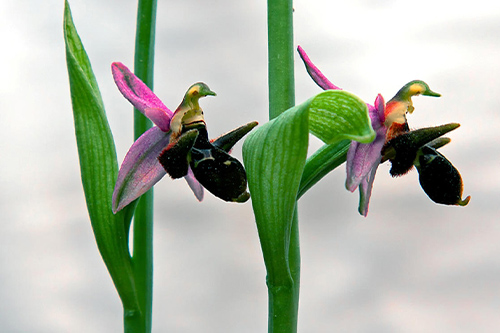
The Rich Flora of Azerbaijan: Rare Plants, Unique Trees & the Magic of Nature
🌿It’s no secret that Azerbaijan is a land of stunning contrasts — not only in its culture and history but also in its breathtaking natural diversity. Once here, you’re surrounded by a living gallery of nature’s masterpieces: the jagged blue mountains of Guba, the mirror-like surfaces of Lake Goygol, Maralgol, and Nohurgol in Gabala, reflecting the deep green forests of the Greater and Lesser Caucasus, the sapphire shores of the Caspian Sea covered in mossy rocks and echoing seagulls' cries, the mystical fog wrapping the rooftops of ancient villages like Saribash (Gakh) and Laza (Gusar), and finally, the silver-haired waterfalls of Ilisu and Seven Beauties dancing with rainbows in the sunlight.🌍 This natural wealth is no accident — Azerbaijan is home to 9 out of the 11 climate zones that exist on Earth! Thanks to this, the flora of Azerbaijan is incredibly rich and diverse, from the desert thornbushes of Absheron to the lush lemon groves of the subtropical Lankaran region. 🌱 Rare and Endemic Plants of AzerbaijanEach plant in Azerbaijan tells a story — a living relic of climate, geography, and evolution. Here are some of the most rare and unique plants and endemic trees of Azerbaijan:🌲 Eldar Pine (Pinus eldarica)This ancient and rare conifer is endemic to Azerbaijan and grows specifically in the Eylir-Ough ridge region in the northwestern part of the country. The area where the Eldar Pine thrives is estimated to be around 80 million years old. Known for its resilience to heat and drought, the tree’s needles are rich in carotene and vitamin C. Its wood is used in construction, and the species is currently protected and listed in the Red Book of Azerbaijan.🌳 Caspian Gleditsia (Gleditsia caspica)A drought-resistant and undemanding tree that reaches up to 8–10 meters in height, the Caspian Gleditsia is primarily found in coastal regions of the Caspian Sea. It’s highly valued in traditional medicine — its leaves and seeds are used to treat high blood pressure, bronchial asthma, and vascular spasms. Like many endemic plants of Azerbaijan, it is considered rare and endangered.🌸 Kharybulbul (Ophrys caucasica) — A Floral Symbol of AzerbaijanThis poetic and symbolic flower, found only in Azerbaijan — particularly in Karabakh (Shusha), Zakatala, and Gakh — has become a national emblem. Its striking petals shimmer in shades of malachite and deep purple, and its shape resembles a soaring nightingale surrounded by thorns. The name Kharybulbul is derived from the Azerbaijani words “xar” (thorn) and “bülbül” (nightingale), emphasizing both its visual uniqueness and its deep cultural symbolism.🌿 A Treasure for Botanical ScienceThe rich biodiversity of Azerbaijan has long attracted the attention of botanists, algologists, geobotanists, dendrologists, ethnobotanists, and palynologists. The presence of numerous relict and endemic plant species makes Azerbaijan a significant site for scientific research and eco-tourism development.During the Soviet era, many prominent botanists contributed to studying and preserving the plant heritage of Azerbaijan, including:Y.S. MedvedevD.I. SosnovskyV.I. KovalevskyL.F. MlokosevichP.Z. Vinogradov-NikitinTheir scientific legacy lives on in Azerbaijan’s botanical gardens, national parks, and ongoing programs aimed at environmental protection, reforestation, and sustainable ecotourism.

Baku Zoo – A Wild Journey in the Heart of the City
🦁Looking for a fun and educational escape in Baku? 🐾 Baku Zoo is the perfect place where nature meets the city, offering an exciting experience for families, children, and animal lovers alike. It's not just a zoo – it's a story of conservation, heritage, and connection with wildlife.🌿 A Glimpse into HistoryThe roots of Baku Zoo stretch back to 1928, making it not only one of the oldest zoos in Azerbaijan but also a cultural landmark in the entire Caucasus region. Originally a modest menagerie with only a handful of animals, the zoo has witnessed nearly a century of transformation. Over the decades, it has changed locations multiple times, each move reflecting the growing interest in wildlife preservation and the increasing demand for a better environment for animals.In 1985, Baku Zoo found its current home in the Narimanov district — a spacious and greener location designed to offer more naturalistic enclosures and a more enjoyable experience for visitors. Since then, it has evolved into a beloved destination for families, school groups, and tourists, blending education, recreation, and conservation. The zoo's long-standing presence has made it a part of many generations’ childhood memories, and today it continues to grow as a sanctuary for rare and exotic species.🐅 Who Lives Here?Baku Zoo is home to over 150 species of animals and birds. You’ll meet familiar favorites like lions, tigers, bears, and monkeys, but also get a rare glimpse of species you won’t see anywhere else in the region:White-tailed eagleRed ibisPelicans and flamingosCaracal (desert lynx)Transcaucasian urialRare reptiles and exotic fishFrom graceful birds to mighty predators, the zoo offers a close-up view of wildlife from Azerbaijan and around the world.👨👩👧 A Perfect Place for FamiliesThe zoo is designed with kids in mind — spacious walkways, shaded areas, informative signs, and even a small play zone. It’s both fun and educational, giving young minds a better understanding of biodiversity and environmental care.🎟️ Tickets and Visiting InfoThe zoo is open daily. You can buy tickets directly at the entrance or conveniently purchase them online here.Opening Hours:🕘 10:00 AM – 6:00 PM (Last entry at 5:30 PM)📍 Address: 1128/38, A.M. Sharifzade St, Narimanov district, Baku🌟 Why You Should VisitWhether you’re traveling with kids, exploring Baku with friends, or just looking for a peaceful green escape, Baku Zoo offers a unique blend of nature and urban culture. It's a perfect way to add something wild to your Azerbaijani adventure!

Discover Nizami Street — Baku’s Cultural and Social Hub
A place where history meets modern life and every step is a journey through the cultural soul of Azerbaijan’s capital.If you ask any local in Baku where the city’s liveliest, most elegant and vibrant street is — most will instantly name Nizami Street. Yet among the people, it’s still lovingly called by its old name — Torgovaya (meaning "the Trading Street"). It’s more than just a street; it’s a symbol, a rhythm, a reflection of Baku’s identity.📍 From the City Center to the Seaside — a Journey of EmotionsNizami Street stretches across the historical heart of Baku — from west to east. It begins near the former State Bank building, flows through the core of the city, merges into the famous Fountains Square, and eventually winds its way toward the Caspian coast and Baku Boulevard.This is the ultimate pedestrian route: no cars, smooth paving, inviting benches, cozy street cafés, and architecture that captures your attention. This place invites you to take your time and soak in the atmosphere — whether you're a visitor or a native.🕰️ A Timeline Written in StoneNizami Street rose to prominence during Baku’s oil boom in the second half of the 19th century. What was once the city’s edge quickly turned into a bustling commercial hub. That’s where the name Torgovaya came from — “The Trading Street.”Lavish buildings in European styles began to appear, alongside bakeries, boutiques, flower shops, candy stores, and other small businesses. By the late 1800s, Torgovaya had become the most commercially dense street in the city.Later came the Soviet-era “Stalin-style” architecture, and in the modern age of independence — sleek buildings made of glass and metal. Yet despite the evolution, the aesthetic remains harmonious thanks to the use of Gobustan limestone, which gives the whole area its iconic creamy glow and timeless elegance.👠 Torgovaya as a City Stage: See and Be SeenFor Baku residents, strolling along Torgovaya is more than leisure — it’s tradition. People come here to express themselves, meet friends, share stories, and simply enjoy life. It’s a public catwalk where everyone brings their unique style and energy, creating a vibrant urban mosaic.In the evenings, the street comes alive with a colorful mix of people — stylish youth, elder locals, couples, artists, families, and curious tourists. It’s always buzzing, always welcoming.🛍️ When Shopping Meets StrollingWhatever you're looking for, you’ll find it on Nizami Street.You’ll find global favorites like Adidas, Levi’s, Mango, Zara, Starbucks, KFC, and McDonald’s all along the street. Local flavors await in restaurants like Firuze and Dolma, alongside Turkish, Arabic, and European cuisines.Don’t miss iconic shopping centers like TSUM (Central Department Store) and BUM (Baku Universal Mall). You can start your day with coffee, enjoy shopping at noon, and end your evening with a delicious open-air dinner — all in one place.🎭 Culture Around Every CornerNizami Street goes beyond shopping — it opens the door to Baku’s vibrant cultural scene. You'll find the Opera and Ballet Theater, Russian Drama Theater, Youth Theater, and the iconic Nizami Cinema — one of the oldest in the city.This close concentration of venues makes it easy to turn an ordinary stroll into a full cultural experience.🏞️ Landmarks NearbyTorgovaya is a perfect starting point to explore Baku’s other attractions:Baku Boulevard — home to museums, a giant Ferris wheel, and stunning views of the Caspian Sea.Molokan Garden — a peaceful green park with fountainsIcherisheher (Old City) — a UNESCO World Heritage site with ancient walls and the Palace of the ShirvanshahsWalking along Nizami Street is like peeling back the layers of the city's rich and colorful history.💭 Then and Now — A Bit of NostalgiaOld-school Baku locals still remember the legendary pastry shop near the “Azerbaijan” cinema, the “Shakhnovich Store” where champagne was once cheapest in town, and the “Book Passage,” once home to street artists.Torgovaya continues to evolve — shops change, facades renew, trends come and go — but its spirit never fades.✅ Why You Should Visit Nizami Street in Baku:It’s Baku’s main pedestrian arteryAn architectural journey from the 19th to 21st centuriesIdeal for shopping, dining, and relaxingFull of cultural highlightsA true reflection of Baku’s vibrant spirit✨ Nizami Street is not just a road — it’s an experience.It’s a city stage, where every passerby becomes part of the play. Come, walk, explore and discover the soul of Baku — starting from the street where it beats the loudest. 💙

May 28 – Azerbaijan’s Independence Day: A Symbol of Pride and Freedom
May 28 is one of the most significant national holidays in Azerbaijan, celebrated with pride and joy across the country. In 2025, Azerbaijan marks the 107th anniversary of the establishment of the Azerbaijan Democratic Republic (ADR) — the first secular and democratic state in the Muslim East. On this day, the people of Azerbaijan proudly and gratefully commemorate the historic events of 1918.But why is this day so important for the nation, and how did the country reach its independence? Let’s dive into history and explore the key milestones of Azerbaijan’s road to freedom.🔙 The Road to IndependenceIn the early 20th century, Azerbaijan was part of the Russian Empire. Social and cultural oppression was especially harsh for the Muslim population. Azerbaijanis faced serious obstacles in receiving education in their native language and were heavily restricted in terms of career and civil rights. The Russian imperial government encouraged the settlement of Russian, Armenian, and German communities, often granting them special privileges.At the same time, the economy was struggling. Although Baku was a global leader in oil production, the local petroleum industry was experiencing a decline. Most of the oil fields were controlled by foreign and Russian entrepreneurs, who heavily exploited Azerbaijani workers. Laborers endured 12–15 hour shifts in dangerous conditions for minimal wages. Lack of modern technology and safety standards led to frequent injuries and tragedies.Cultural imbalance was also apparent. Christian communities in the South Caucasus freely published newspapers, opened churches, and promoted education, while the Muslim population was denied similar rights. Yet, even under these harsh conditions, a powerful national awakening began to take root among Azerbaijanis.🌟 The Great Minds That Inspired a NationDespite the restrictions, the early 20th century witnessed a growing national consciousness. Enlighteners, scholars, journalists, and public figures like Hasan bey Zardabi, Mammad Amin Rasulzadeh, Ahmad Agayev, Fatali Khan Khoyski, and Alimardan bey Topchubashov played pivotal roles in shaping public opinion and promoting cultural and political revival.They organized All-Russian Muslim Congresses, established political parties and social organizations, and spoke out against the injustices of the Tsarist regime. Their activism laid the groundwork for the idea of an independent Azerbaijani state.🕊 A Defining Moment in History: The Birth of the RepublicFollowing the collapse of the Russian Empire in 1917, political reorganization swept through the Caucasus.In February 1918, the Transcaucasian Sejm was formed in Tbilisi, including 44 delegates from the Azerbaijani faction. However, due to internal disagreements, Georgia declared its independence. Soon after, on May 27, Azerbaijani delegates held a separate meeting, where they decided to form a National Council.On May 28, 1918, the Azerbaijan National Council officially proclaimed the country’s independence. Mammad Amin Rasulzadeh was elected as the Council's chairman, and Fatali Khan Khoyski became the first Prime Minister of the newly formed republic.📜 Key Points of the Declaration of Independence:Azerbaijan proclaimed itself an independent and sovereign nation encompassing the eastern and southern parts of the Caucasus;Azerbaijan chose a democratic republic as its form of government;Equal civil and political rights were assured for all citizens, regardless of ethnicity, faith, gender, or social background;All ethnic communities residing within Azerbaijan were granted broad opportunities for cultural and political self-expression.Until the convocation of the Constituent Assembly, the country would be governed by the National Council and a Provisional Government.🏛 The First Secular State in the EastThe government of the Azerbaijan Democratic Republic was first located in Tbilisi, then relocated to Ganja, and finally established itself in Baku in September 1918. One of the most groundbreaking achievements of the republic was the establishment of the first parliamentary system in the Muslim East and granting women the right to vote — an unprecedented step in the region.The parliament included 120 deputies — 80 representing Azerbaijanis and 40 from ethnic minorities. During its 23-month existence, the parliament held 155 sessions and reviewed more than 270 legislative proposals — 230 of which were passed into law.🌍 International Recognition and Tragic EndThe Azerbaijan Democratic Republic gained recognition from 16 countries, including France, Italy, the USA, Turkey, Iran, and Georgia. However, Soviet Russia refused to acknowledge its independence. In April 1920, taking advantage of the republic's military weakness, Bolshevik forces invaded and established Soviet control over Azerbaijan.✨ A Symbol of National Identity and PrideThough the ADR lasted less than two years, its legacy is invaluable. It marked the first attempt to build a democratic, secular, and national state in the Muslim East. The date of its founding — May 28 — remains a lasting symbol of freedom, honor, and the unyielding spirit of the Azerbaijani people.🔔 Azerbaijan Today: Celebrating FreedomToday, Azerbaijan is a free and independent country, confidently stepping into the future. But the foundation of this sovereignty was laid on May 28, 1918.🏛 Modern Celebrations: A Day of Unity and FestivitiesEvery year on May 28, Azerbaijan marks the occasion with heartfelt national pride and a profound sense of patriotism. The day is filled with official ceremonies, concerts, exhibitions, and educational events:📍 Flag Square in Baku – the heart of the celebrations🎤 Concerts and festivals – from traditional mugham to modern pop🏛 Visit to the ADR History Museum in Baku📚 Lectures and exhibitions in schools and universities💬 Why Remember May 28?Because it is the day Azerbaijan declared itself a free and sovereign nation. It reminds us that freedom is not a gift — it is earned. And the heroes of the past are the pillars of the future.Want to discover more about the culture, history, and beauty of Azerbaijan? Stay connected with Travelblogger.az and don’t miss our upcoming stories!

Unveiling Azerbaijani Mugham: The Heartbeat of a Nation's Music
Have you ever heard music that speaks directly to your soul—bypassing words, reaching straight into your emotions? Step into the world of Azerbaijani Mugham — a rare musical form that lives between sound, stillness, and emotion. Mugham is not just a genre; it is the soul of Azerbaijan, its breath, its philosophy, and its ancient history woven into voice, rhythm, and improvisation.Recognized by UNESCO as a Masterpiece of the Oral and Intangible Heritage of Humanity, Azerbaijani Mugham is far more than music — it is a spiritual expression, a cultural treasure, and a living tradition. This ancient art form harmoniously blends Eastern poetry, philosophical reflection, and musical virtuosity into an emotionally charged performance that touches the soul. Each Mugham composition is a meditative journey, where improvisation meets structure, and where the performer channels centuries of wisdom and feeling through voice and instrument. As a symbol of national identity and artistic pride, Mugham continues to captivate audiences both in Azerbaijan and around the world, standing as a timeless bridge between the past and the present.🕰 Ancient Roots: The Origins of MughamMugham has ancient origins that stretch back millennia. As early as the 9th–10th centuries, musical storytelling based on improvisation and spiritual themes was already thriving in the lands of modern-day Azerbaijan. Over the centuries, Mugham became an essential part of royal courts and folk gatherings, echoing in the halls of palaces, caravanserais, and the streets of Old Baku.Shaped by Arabic, Persian, and Turkic influences, Mugham evolved into a highly structured musical system. But it was in Azerbaijan that Mugham matured into an independent and sophisticated art form—a living legacy of the nation's cultural and emotional landscape.🎤 Mugham Today: A Bridge Between Past and FutureModern Mugham is a living, breathing tradition. While staying faithful to its classical roots, it continues to evolve—merging with jazz, rock, and even electronic music to attract younger audiences and keep the tradition alive for future generations.Azerbaijan celebrates Mugham through major events such as the International Mugham Festival in Shaki, and with the establishment of Mugham Centers in cities like Baku, Agdash, and Shusha. These centers host concerts, workshops, and academic research, making Mugham more accessible than ever.The Baku Mugham Center, located on the scenic waterfront, is a stunning cultural space where visitors can enjoy live Mugham performances in an atmosphere that is both modern and authentic.🧿 How Mugham Sounds: Instruments & StructureA Mugham performance takes listeners on an emotional voyage, often unfolding over 20 minutes to several hours. It is based on a modal system and unfolds through melodic and rhythmic improvisation, with each moment shaped by the performer's emotions and the mood of the moment.The classic Mugham ensemble includes:🎤 Khanende – A vocalist with exceptional control and emotional expression.🪕 Tar is a long-necked lute known for its rich, echoing sound.🪗 Kamancha – A bowed instrument known for its voice-like sound.🥁 Gaval – A small frame drum that provides rhythmic nuance and character.Together, they create a soundscape that feels like a dialogue between the soul and the universe.👑 Legendary Performers: Voices of MughamAzerbaijan has produced many legendary Mugham artists who brought this ancient art to the global stage:Aliagha Vahid – A poet who intertwined Mugham with the classical gazelle poetic form.Alim Qasimov – A living icon whose expressive performances have captivated audiences worldwide. His collaborations with his daughter Fargana Qasimova reflect a powerful generational bond.Khan Shushinski, Rubaba Muradova, and Seyid Shushinski – Pioneers of the 20th century who defined the golden age of Mugham.Aliagha Vahid – A poet who intertwined Mugham with the classical gazelle poetic form.📍 Where to Experience Mugham LiveIf you’re visiting Azerbaijan, don’t miss the opportunity to experience live Mugham performances. Here are the best places:Baku Mugham Center – Regular concerts by master performers in an elegant venue on the Caspian Sea.Shusha – Known as the spiritual capital of Mugham, this historic city hosts festivals and was home to many great Mugham artists.National Conservatory of Azerbaijan – Offers academic training in Mugham and holds public recitals.Museum of National Instruments – Explore traditional instruments used in Mugham performances.Icherisheher (Old City), Baku – Discover street performances in the ancient heart of the city.🌍 Mugham on the World StageAzerbaijani Mugham has earned a global reputation, with performances at Carnegie Hall, La Scala, Bolshoi Theatre, and the Montreal Festival. It is studied in music academies worldwide and continues to inspire musicians and audiences alike with its depth and beauty.💡 Why You Should Hear Mugham at Least OnceIt’s a living history of Azerbaijan, passed down through generations.It’s a meditative, timeless experience that connects you to something beyond words.It’s a showcase of human emotion and artistic improvisation at its finest.🎧 Mugham is not just heard — it is felt. Whether you're a music lover, a cultural explorer, or simply curious, Mugham promises an unforgettable experience that will stay with you long after the last note fades.

Discover Azerbaijani Wine: Ancient Traditions, Modern Taste
Discover Azerbaijani Wine: Ancient Traditions, Modern TastePlanning a trip to Azerbaijan and looking to explore more than breathtaking landscapes and ancient architecture? Then you must experience Azerbaijani wine—a drink with a 6,000-year history that is now undergoing a true renaissance. Winemaking in Azerbaijan is not just part of the cultural heritage; it’s a modern art form combining age-old traditions with innovation.A Brief History of Winemaking in AzerbaijanAzerbaijan is rightly considered one of the cradles of winemaking. Archaeological findings in Ganja, Shamakhi, and the Karabakh region show that grapes were cultivated here over 6,000 years ago. Even in ancient times, Caucasian wines were highly valued in Persia, Byzantium, and the East. During the Soviet era, Azerbaijan became one of the USSR's key wine-producing regions.After gaining independence, the wine industry experienced a decline but has seen rapid growth in the past two decades. Family-run wineries, modernized factories, and export-oriented brands now shape a vibrant wine scene.A New Era: Tradition Meets InnovationToday, Azerbaijan is home to dozens of modern wineries that blend traditional production methods with new technologies. Winemakers focus on grape quality, varietal diversity, and eco-friendly practices.Many wineries adopt organic wine production, avoiding chemical fertilizers and pesticides. As a result, Azerbaijani wines are known for their clean aromas, vibrant flavors, and high quality.Top Winemaking Regions of AzerbaijanGanja and Shamkir – among the oldest winemaking areas.Gobustan and Shamakhi – offer unique mountain terroirs.Ismayilli and Oghuz – perfect for white and sparkling wines.Lankaran and the Talysh Mountains – a lush subtropical zone with emerging promise for viticulture.Karabakh – a historic wine region now experiencing a revival.Popular Grape Varieties in AzerbaijanAzerbaijan cultivates both indigenous and international grape varieties, including:Madrasa – a local red grape known for its rich taste.Saperavi – produces deep red wines with fruity notes.Bayanshira (Bayan Shira) – a delicate white grape ideal for fresh, crisp wines.Rkatsiteli, Merlot, Cabernet Sauvignon, Chardonnay – international varieties that thrive in the local climate.Isabella – used for semi-sweet fruit wines.Muscat – aromatic grapes perfect for dessert wines.Top Azerbaijani Wineries to VisitASPI Winery (Savalan)Situated in Gabala, this top-tier winery is renowned for crafting award-winning wines. Try their Cabernet Sauvignon, Chardonnay, or sparkling wine.Fireland VineyardsOne of the largest wineries near Baku, known for both table and aged wines. Don’t miss the Fireland Reserve collection.Sharg UlduzuSituated in Shamakhi, this winery focuses on native grape varieties. Try Madrasa and Bayanshira wines.Chabiant WineryA charming family winery in Ismayilli, offering wine tastings and tours. Their rosé and white wines are particularly refreshing.Meysari Organic WineryAzerbaijan’s first fully certified organic winery, also in Shamakhi. Their natural dry wines meet strict European standards.Pomegranate Wine – A Symbol of Azerbaijani OriginalityOne of the most distinctive products of Azerbaijani winemaking is pomegranate wine. Azerbaijan is known for producing some of the world's best pomegranates, especially in the Goychay region, home to the annual Pomegranate Festival.This wine boasts a deep ruby hue, a balanced sweet-and-tart flavor, and a vibrant fruity bouquet. Thanks to its high antioxidant content, pomegranate wine is not only delicious but also beneficial for health. It pairs wonderfully with meat, cheese, and traditional Azerbaijani desserts, and is a top choice among visitors looking for gourmet souvenirs.Top producers of pomegranate wine include:AzGranata (Goychay) – the country’s largest producer, exporting globally and winning international awards.Nar Wine House – a smaller, artisanal producer offering handcrafted wines with traditional methods.Wine Tourism in Azerbaijan: A Tasteful JourneyWine tourism in Azerbaijan is booming. Travelers can visit vineyards, learn about the production process, enjoy tastings, and even help with grape harvesting.Top wine tourism destinations:Shamakhi – the hub of organic winemaking.Gabala – a picturesque region with elite wineries.Goychay – the pomegranate capital of Azerbaijan.Sheki and Zagatala – where wine meets traditional crafts and ancient architecture.Tips for Wine LoversPair Madrasa red wine with piti, a traditional Azerbaijani lamb dish.For an aperitif, enjoy pomegranate wine with cheese or light appetizers.On a warm day, refresh with a glass of Bayanshira white wine while enjoying views of the Caucasus Mountains.Azerbaijani wines make for unique souvenirs. Look for hand-painted bottles and elegant gift boxes.Azerbaijani winemaking is more than just a craft—it’s a journey through history, culture, and nature. Each bottle captures the essence of the land, the spirit of its people, and the warmth of the sun that nurtures the grapes. Whether you’re a seasoned wine connoisseur or a curious traveler, Azerbaijan offers unforgettable wine experiences and flavors.Embark on a wine tour in the Land of Fire, and you might just fall in love with Azerbaijani wine at first sip.

Caspian Caviar: Discovering the Black Gold of Azerbaijan
When it comes to the world’s most refined delicacies, black caviar is always associated with luxury, elegance, and timeless taste — a favorite at royal banquets and diplomatic receptions. Served on crispy toast with a glass of chilled champagne or vodka, black caviar is the crown jewel of haute cuisine. But behind its exquisite flavor lies a centuries-old tradition rooted in the depths of the Caspian Sea — a natural treasure that embraces the shores of Azerbaijan.Black caviar is not just a gourmet pleasure. It is a symbol of natural wealth, rarity, and cultural heritage, shaped by generations of craftsmanship and eco-consciousness. And if you want to explore its story, taste, and secrets, there is no better place than Baku, the capital of Azerbaijan — your starting point for a true culinary adventure.Caspian Sturgeon: The Ancient Ruler of Azerbaijani WatersThe Caspian Sea is more than a body of water — it is an entire ecosystem, larger than some countries, with its own rhythm of life. Among its most valuable inhabitants is the sturgeon, a prehistoric fish species that has survived over 200 million years, outlasting dinosaurs and glaciations. For centuries, sturgeon has played an essential role in the diet and culture of the Caspian peoples.Azerbaijan has long been a major center of sturgeon fishing and processing. The Kura River delta and Absheron Peninsula have historically been known for their abundant sturgeon harvests. Here, fishers passed down traditional methods of processing sturgeon and harvesting caviar — a craft preserved to this day.Due to overfishing and environmental pressures, sturgeon is now a protected species. In Azerbaijan, specialized fish farms and scientific programs ensure the preservation and restoration of the population — enabling people to enjoy Caspian caviar responsibly and sustainably.Black Caviar: The "Black Gold" of the Caspian SeaBlack caviar is produced from several sturgeon species, primarily beluga, sevruga, sterlet, and Russian sturgeon. Every type features its own distinct flavor, grain size, and texture. In Azerbaijan, this delicacy is regarded as a national treasure — an emblem of tradition, elegance, and natural abundance.Often referred to as the "black gold" of the Caspian, caviar is not only prized for its taste but also for its remarkable health benefits. Rich in high-quality protein, omega-3 fatty acids, vitamins A, D, and E, as well as vital minerals, black caviar is a true nutritional treasure.Key Health Benefits of Black Caviar:💡 Boosts brain function and improves concentration.🔄 Stimulates cell regeneration and slows aging.❤️ Supports cardiovascular health.😌 Reduces stress and fatigue, promoting emotional balance.In today’s fast-paced lifestyle, black caviar offers not just indulgence, but also a meaningful addition to your diet.Where to Buy Black Caviar in BakuBaku is one of the few cities in the region where you can legally purchase certified, fresh black caviar produced at local sturgeon farms. Here are some trusted spots to find top-quality caviar:1. Caviar Boutiques and Gourmet ShopsBaku Caviar House – A boutique offering premium black caviar and sturgeon-based products, all sourced from Azerbaijani aquaculture farms and fully certified to meet international standards.Zira Fish Farm – A well-known aquaculture facility producing sturgeon and caviar under strict quality control, located on the Absheron Peninsula.AzerCaviar – A reputable Azerbaijani brand offering caviar that complies with international CITES certification, ensuring responsible and legal production.2. Restaurants and Caviar Tasting ExperiencesIf you prefer to taste before you buy, these restaurants offer exquisite caviar-based dishes:Nakhchivan Restaurant – Traditional Azerbaijani cuisine with sturgeon and caviar specialties.Chinar – A chic, contemporary restaurant offering Caspian delicacies with modern flair.Fish & Caviar Bar Baku – A seaside bar where you can sample fresh black caviar with champagne, while enjoying stunning Caspian views.How to Choose Authentic Caviar: Traveler’s TipsPackaging: Genuine caviar always comes with CITES certification.Appearance: Real caviar should have a natural grayish-black hue — not overly dark or shiny.Smell and Taste: Fresh caviar should have a clean, briny aroma — never overly fishy.Storage: Ensure it’s kept refrigerated between -2°C and +2°C for optimal freshness.A Caviar Trail Through AzerbaijanIf you're into gastro-tourism, follow this trail for a true caviar experience:Visit Zira Fish Farm to learn about sturgeon breeding and caviar production.Purchase genuine caviar at local markets or at the international terminal of Baku Heydar Aliyev Airport.Buy authentic caviar at local markets or the international terminal at Baku Heydar Aliyev Airport.Final Thoughts: A Taste to RememberBlack caviar is not just a delicacy — it represents Azerbaijan’s cultural heritage and the vibrant history of the Caspian region. When in Baku, don’t miss the chance to experience this refined taste that embodies tradition, nature, and the gourmet spirit of the country.

Azerbaijan’s Cinematic Legacy: Discovering the Origins of National Film Day
Every year on August 2nd, Azerbaijan celebrates an important cultural event — National Film Day. This date was established by President Heydar Aliyev in 2000 to honor the rich legacy of Azerbaijani cinema, which is considered one of the oldest in the region.The Forgotten Pioneer: Alexander Mishon and the Birth of Azerbaijani CinemaWhile many believe that Azerbaijani cinema began in 1916 with the film "In the Kingdom of Oil and Millions", research by film historian Aydin Kazymzade revealed otherwise. In fact, the origins of Azerbaijani cinema date back to 1898, thanks to the work of Alexander Mikhailovich Mishon, a photographer of Polish-Jewish descent who moved from Kharkiv to Baku in 1884.During the oil boom, Baku was a thriving industrial center, and Mishon captured its transformation on film. His 30-second documentary "Fire on Bibi-Eibat" is considered the first film ever shot in Azerbaijan — and one of the world’s earliest industrial films.Alexander Mishon’s Legacy in BakuMishon wasn’t just a filmmaker — he was a visionary. He opened a photo studio on Torgovaya Street (now Nizami Street), where he taught photography to both men and women — a groundbreaking act in conservative Azerbaijani society at the time. He also founded the Baku Photographic Society, which welcomed both genders, a bold move for the era.For his contributions to photography and visual arts, Mishon was awarded medals from the Imperial Russian Technical Society and received honors at international exhibitions, including in Paris.Early Azerbaijani Films and Theater InfluenceBefore the revolution, Azerbaijani cinema evolved under strong theatrical influence. In 1916, the first adaptation of the musical comedy "Arshin Mal Alan" by Uzeyir Hajibeyov was filmed. Due to conservative norms, female roles were played by men, and invited Russian actresses couldn’t quite reflect the cultural authenticity of Azerbaijani women.Cinema in the Soviet Era: Nationalization and CensorshipAfter the establishment of Soviet rule in 1920, Azerbaijani cinema was nationalized. State authorities took over production, financing, and content supervision. Revolutionary leaders like Nariman Narimanov and cultural figures such as Hanafi Teregulov and Muslim Magomayev initiated the construction of Azerbaijan’s first movie theater in 1922 and laid the foundation of the national film industry.Celebrating Traditions and Promoting Patriotism Through FilmAzerbaijani cinema has always emphasized traditional values. Films often featured wedding rituals, folk dances, and national music, reflecting the country’s cultural identity. In the 1920s and 1930s, films like "Bismillah" (1925), "Sevil" (1929), and "House Over the Volcano" (1929) addressed social issues such as religious fanaticism, sparking important cultural conversations.A New Era for Women in Azerbaijani FilmIn 1945, a new version of "Arshin Mal Alan" was released, and for the first time, female characters were portrayed by talented Azerbaijani actresses — Leyla Badirbeyli and Minavar Kalantarli. The film became a cultural phenomenon and gained international fame.Classics of Azerbaijani Cinema in the 20th CenturyThroughout the Soviet period and beyond, Azerbaijani filmmakers continued producing works that combined patriotism, history, and social commentary. Some of the most beloved films include:"Bakhtiyar" (1941) – a story of heroism during wartime"Son of the Motherland" (1942) – a personal tale in a national struggle"The Caspians" (1944) – life on the Caspian Sea"Our Teacher Jabish" (1970) – about education and enlightenmentOther notable titles include the comedies "If Not That One, Then This One", "Where Is Ahmed?", "Ulduz", dramatic films like "Stepmother" and "Beyond the Aras", and historical epics such as "Babek" and "Nasimi". Children’s classics like "The Magic Robe" and "The Secret of the Fortress" remain favorites across generations.Why Travelers Should Explore Azerbaijan’s Cinematic HeritageToday, visitors to Baku and other cities can explore film museums, historic theaters, and exhibitions dedicated to the country’s cinematic evolution. If you're interested in culture and history, Azerbaijan offers a unique opportunity to experience the development of cinema in a country where East meets West.Attend the National Film Day celebrations on August 2nd, walk the streets where early films were shot, and immerse yourself in the powerful stories that continue to shape Azerbaijani identity. Whether you're a film buff or a curious traveler, Azerbaijan's cinematic legacy is a hidden cultural gem waiting to be discovered.

How Is the Weather in Baku? Everything a Traveler Should Know
Baku, the capital of Azerbaijan, is often imagined as a warm, sunny, and welcoming city. Colorful postcards, social media reels, and travel videos all paint the picture of a perfect southern getaway. But how is the weather in Baku really? Let’s take a closer look to help you plan a comfortable and unforgettable trip.Baku’s Climate: What to Expect Throughout the YearLocated on the southern shore of the Absheron Peninsula, along the Caspian Sea coast, Baku enjoys a semi-arid subtropical climate. This results in warm, dry summers and mild winters, making Baku a desirable destination in any season.Spring (March to May) is ideal for sightseeing and walking tours. Temperatures gradually increase from about +10°C in March to approximately +25°C by May.Summer (June to August) is the ideal season for those who enjoy beach vacations. Air temperatures generally range between +28–33°C, and the Caspian Sea warms up to a pleasant +25°C.Autumn (September to November) offers a gentle transition with warm days and swimmable sea temperatures, especially in September.Winter (December to February) is mild, with daytime temperatures typically between +4–8°C. Snow is rare, but the wind can make it feel colder.Windy Baku: A City Shaped by the BreezeOne of the most distinctive features of Baku is its windy weather. The city is famously known for its constant breezes, which are part of its charm and identity.Khazri is a cold north wind from the Caspian that brings refreshing air during hot summer days.Gilavar is a warm southern wind that softens the chill during winter.During the summer, wind speeds are usually around 6–12 km/h, providing a cooling effect. In winter, however, winds can reach up to 36–38 km/h, making the weather feel much colder than it actually is.Beach Season in BakuHow is the weather in Baku for a beach vacation? The best time for swimming and sunbathing is from mid-June to September, when sea temperatures reach +24–26°C. Popular beaches like Shikhov, Bilgah, and Zagulba become vibrant spots filled with both locals and tourists. Surprisingly, some visitors even enjoy swimming in October, when the water drops below 20°C.Gobustan: Cooler and Full of SurprisesLooking to explore beyond the city? Head to Gobustan, located about 60 km from Baku. Famous for its mud volcanoes and ancient petroglyphs, this area is typically 2–4°C cooler than Baku. The wind here feels even stronger, adding a fresh and adventurous twist to the experience.Practical Tips for TravelersSun protection is essential during the summer. Pack a high-SPF sunscreen (SPF 50 recommended), sunglasses, and a wide-brimmed hat.Dress appropriately for the season — you can easily get sunburned or chilled depending on the time of year.Check the weather forecast, especially if you plan day trips to places like Gobustan or the Absheron beaches.Conclusion: Baku — A City Where Weather Has CharacterSo, how is the weather in Baku? In short — diverse and full of surprises. It’s a city where heat meets sea breeze, and the sun competes with the wind. This unique climate is what gives Baku its distinctive charm and makes it a fascinating destination to visit in any season.Plan your trip, follow our blog, and discover the true spirit of Azerbaijan’s dynamic capital on travelblogger.az!

From Euro to Manat: How Azerbaijani Currency Tells the Story of Culture, History, and National Spirit
From Euro to Manat: How Azerbaijani Currency Tells the Story of Culture, History, and National SpiritThe first thing every visitor to Azerbaijan encounters isn’t just the country’s warm hospitality, but also the Azerbaijani manat. Whether it’s a ride from the airport, the purchase of freshly baked chorek from a tandoor, or a visit to a cozy café in the Old City — the manat is your first companion. But have you ever considered that banknotes are more than just a means of payment? They are a visual encyclopedia of the country.Modern Azerbaijani banknotes are not merely money — they are works of art and cultural expression. Austrian designer Robert Kalina, famous for crafting the euro’s iconic look, was chosen to bring the manat’s visual identity to life. His transition from euro to manat became a vivid example of how European design can respectfully and creatively interpret national identity.1 Manat: Music and CraftsmanshipThe 1-manat banknote features traditional Azerbaijani musical instruments: tar, kamancha, and ghaval, along with musical notes and clefs — all displayed against a rich, ornamented carpet background. It is a tribute to Azerbaijani folk art and musical heritage.On the reverse side, you'll find shebeke — the intricate stained-glass window art that showcases the delicate skill of Azerbaijani artisans.5 Manats: Literary HeritageThis banknote is dedicated to the power of the written word. It features statues of prominent Azerbaijani writers at the entrance to the National Literature Museum, letters of the Azerbaijani alphabet, and ancient books. It is a respectful nod to the nation’s language, literary depth, and historical knowledge. 10 Manats: The Heart of Baku — IcherisheherThe 10-manat banknote features a small map of Icherisheher, the historic heart of Baku — a subtle nod to the maze of alleys rich in heritage and character. Holding this banknote is almost like holding a piece of ancient Baku in your hands.20 Manats: Symbol of KarabakhOn the 20-manat note, you'll find the graceful kharybulbul flower — a rare and meaningful emblem of the Karabakh region. It has become a national symbol of beauty, resilience, and cultural rebirth. This banknote represents the spirit and memory of a deeply cherished land.50 Manats: Science and KnowledgeThe 50-manat note highlights Azerbaijan’s scientific legacy. Chemical formulas, molecular structures, and benzene rings are depicted as a visual metaphor of the nation’s contribution to science and innovation. It shows Azerbaijan as not just a land of tradition, but a forward-moving country embracing progress.100 Manats: Architecture Through the AgesOn the 100-manat banknote, you’ll find a narrative of architectural evolution — from ancient monuments to modern structures. This note connects past, present, and future, reflecting how Azerbaijani culture continues through time while preserving its core identity.200 Manats: A Symbol of Maturity and StabilityThe highest-denomination banknote — 200 manats — was introduced in 2018. Its design emphasizes national pride, featuring the Azerbaijani flag, state emblems, geometric patterns, and elements of modern architecture. Its warm, solid color palette radiates confidence and strength. This is more than currency — it’s a symbol of a mature and self-assured nation.From Euro to Manat: A Story Worth AdmiringThe journey from euro to manat is more than just the story of one designer — it’s a testament to how currency can serve as a gateway to culture, identity, and national values. Robert Kalina, who designed the euro, brought Azerbaijan’s music, literature, science, architecture, and symbolism to life on its banknotes.The manat banknotes were printed with the technical support of a Swiss bank, and the design project was implemented in cooperation with Austrian company OeBS. This collaboration gave Azerbaijan a currency as rich in meaning as it is in design.
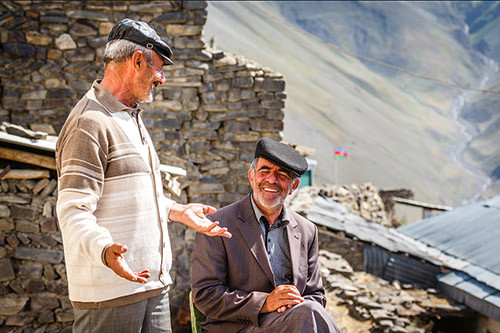
Azerbaijan: A Tapestry of Cultures and Nations
Azerbaijan is more than a nation bridging Europe and Asia — it is a vibrant archive of ancient civilizations and diverse cultures. Despite its relatively compact size, the Republic of Azerbaijan is home to more than 100 ethnic groups, each contributing its own cultural identity to the nation's colorful mosaic. Here, people of different faiths, languages, and traditions coexist peacefully, offering the world a powerful example of real multiculturalism.Lezgins – Guardians of the Northern HighlandsIn the serene village of Laza in the Gusar region, the day begins with the murmur of mountain streams and birdsong echoing off the cliffs. An elderly woman hums a folk tune as she bakes khiran fu, a traditional Lezgin bread, while her grandchildren greet her with cheerful voices: “Paqaman libisar ghuy!” — “Good morning!”Lezgins represent the second-largest ethnic community in Azerbaijan, with a population of approximately 200,000, mainly residing in the mountainous regions of Gusar, Guba, and nearby areas. Known for their poetry, music, dance, and rich cuisine, Lezgins carry on traditions that reflect the spirit of the Caucasus. Persians, Talysh, and Tats – A Bridge Between the East and the CaucasusThe southern regions of Azerbaijan — including Lankaran, Astara, and Ismayilli — are home to ethnic Persians and their subgroups: the Talysh, Tats, and Dagli. These communities have preserved their native languages, customs, and crafts over centuries. Interestingly, nearly 15% of words in modern Azerbaijani have Persian roots, reflecting their linguistic influence.Tats – Keepers of Mountain Artistry and Ancestral Language.Tats are among the oldest ethnic groups in Azerbaijan, tracing their ancestry to Persian-speaking tribes of antiquity. Today, they inhabit regions such as Ismayilli, Shamakhi, and Absheron, with the mountain village of Lahij standing out as a cultural gem.Famous for its cobbled streets, copper workshops, and centuries-old craft traditions, Lahij is a living museum of traditional metalwork, carpet weaving, and woodworking. The Tat language, though endangered, is still spoken by villagers, preserving an ancient voice through song, proverbs, and oral lore.Mountain Jews – Keepers of a Unique Faith and HeritageIn the Guba district lies Krasnaya Sloboda, the only all-Jewish settlement in the former Soviet Union. Known as Mountain Jews, these communities descended from Persian Jews who adopted Judaism centuries ago. Today, they uphold a rich spiritual and cultural heritage, making this town a fascinating stop for cultural travelers. Russians – Cultivating Tradition in Azerbaijani SoilRussians form the third-largest ethnic group in Azerbaijan. While many live in cities such as Baku, Ganja, Sumgayit, and Mingachevir, the rural village of Ivanovka in the Ismayilli region offers a unique glimpse into Russian agrarian life.Founded in the 1840s by Molokan settlers, Ivanovka today thrives on agriculture, choral music, and a sense of community rarely found elsewhere. Imagine a shepherd beneath Mount Quton, reflecting on life while watching his flock graze — a symbol of a simple, harmonious existence.Avars – Carriers of Ancient Mountain TraditionsIn the northern districts of Balakan and Zaqatala, the Avar people maintain age-old customs, including a poetic form of matchmaking. Without saying a word about marriage, a mother of the groom delivers a freshly baked loaf of bread to the prospective bride’s home. If the bread is returned wrapped in a cloth — it’s a silent "yes." If not, it speaks volumes.Udis – Living Legacy of Caucasian AlbaniaIn Nij, a village in the Gabala region, live the Udi people, direct descendants of the ancient Caucasian Albanians. Their language, Udi, contains up to 85% of vocabulary from the extinct Albanian tongue. Visiting Nij is like stepping into a living time capsule — where ancient faith, language, and customs are still very much alive.Unity in Diversity: The Spirit of AzerbaijanAzerbaijan's ethnic groups form a vibrant cultural carpet — each thread unique, yet beautifully interwoven into a cohesive design. Today, over 10 million citizens of diverse backgrounds live under one flag, proudly calling themselves Azerbaijanis.What makes Azerbaijan truly special is not just its historical monuments or landscapes, but the people who embody living history — through their languages, dances, customs, and even bread recipes passed down for generations.Every village has a story. Every ethnic group is a verse in the poem of Azerbaijan. And as long as these cultures sing, craft, and speak — the soul of the nation continues to thrive.
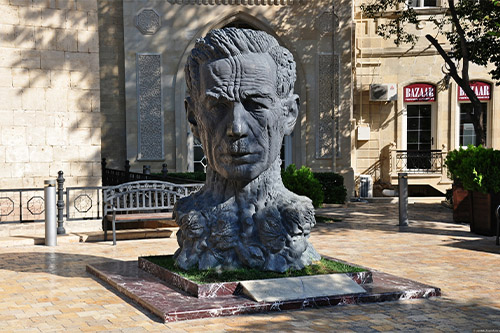
Aliagha Vahid: The Soul of Azerbaijani Poetry
Aliagha Vahid was a prominent Azerbaijani poet and writer, whose name is forever linked with two significant poetic forms: meykhana and ghazal. Born into a modest family, he rose from working-class roots to become one of the most revered voices in Azerbaijani literature.What is Meykhana, and Why is Aliagha Vahid Its Pioneer?Meykhana is a unique form of Azerbaijani oral folk poetry, rooted in improvisation and rhythmic wordplay. Often compared to modern-day freestyle rap, this genre involves multiple poets engaging in a lyrical dialogue. Each participant builds upon the lines of others, and the final, most expressive couplet is echoed by all.Aliagha Vahid was the first to elevate meykhana from a street performance to a refined literary art. His verses blended satire, philosophy, and everyday wisdom, making the genre an integral part of Azerbaijan’s cultural heritage.The Master of Ghazals — Vahid’s Eastern Lyrical VoiceIn addition to meykhana, Vahid gained wide acclaim for his ghazals — lyrical poems traditionally composed of seven couplets with a repeating refrain. This classical genre of Eastern poetry was reimagined by Vahid, who made it relatable to contemporary society. His ghazals explored themes of love, loneliness, reflection, and the beauty of the natural world.A Poetic Monument in the Heart of IcherisheherWandering through the atmospheric lanes of Icherisheher — Baku’s Old City — you’ll come across an extraordinary monument dedicated to Aliagha Vahid. Created by sculptor Rahib Gasanov and architect Senan Salamzade, the bust of Vahid includes figures from his own poems. This unique artistic concept captures the essence of Vahid’s works and his identity as a poet — a fusion of creator and creation.From Humble Beginnings to Literary GreatnessAliagha Vahid was born into a carpenter’s family and spent his early years doing manual labor. He studied for just two years at a madrasah (religious school) before realizing that literature, not religion, would shape his destiny. His turning point came when he joined the literary circle Majme’yush-Shuara, where he was mentored by poets Muniri and Azer Imamaliyev (Buzovnaly).It was Imamaliyev who gave him the pen name "Vahid" — a word with dual meaning in Azerbaijani: “unique” and “unifying.” The name perfectly reflected the poet’s exceptional ability and broad emotional range.Influences of the Greats and Love of the PeopleVahid was deeply inspired by iconic poets such as Nizami, Fizuli, Nasimi, and Khagani. His poems — particularly his ghazals — spread quickly among the people, passed from home to home. This widespread popularity earned him the affectionate nickname Ghazalkhan — the singer of ghazals.A Literary Bond with Sergei YeseninIn 1924, during a visit to Baku, renowned Russian poet Sergei Yesenin met Aliagha Vahid in a local chaykhana (teahouse). This chance encounter sparked a poetic friendship. Vahid introduced Yesenin to the intricate rhythms of Azerbaijani folk music, particularly the Bayati-Shiraz mugham, which later influenced Yesenin’s Persian Motifs. Through Vahid, Yesenin caught a glimpse of the East he longed to explore.A Living Legacy in the Streets of BakuAliagha Vahid is not merely a poet — he embodies the spirit of his time and serves as a lyrical reflection of the Azerbaijani soul. His meykhanas are like melodies from the streets, born from the heart. His ghazals are the fine lacework of emotions, woven with elegance and depth.Amid the ancient walls and timeless echoes of Icherisheher, the legacy of Vahid continues to live and breathe. Vahid’s memory still breathes. His monument is not just a tribute — it is a continuation of his poetry in sculptural form. Anyone who pauses before it will feel that Vahid is not confined to bronze. He is in the breeze, in the rhythm of the city, in the poetic soul of Baku.

Azerbaijani Phrasebook for English-Speaking Tourists
If you're visiting Azerbaijan and find yourself in a situation where nobody speaks your language, don't worry! This practical phrasebook will help you communicate in shops, taxis, cafés, restaurants, or on the street. With it, you’ll be able to ask questions, understand signs, and navigate daily life with ease.Whether you're strolling along the Baku Boulevard, exploring the historic Icherisheher, or heading out to other regions — knowing a few basic Azerbaijani phrases can make your journey smoother and more enjoyable.🗣️ CommunicationEnglish Azerbaijani PronunciationHello! Salam [sah-lahm]How are you? Necəsən? [neh-jah-san]Thank you Təşəkkür edirəm [teh-sheh-kyoor eh-deer-em]Please Zəhmət olmasa / Buyurun [zeh-met ol-mah-sa / boo-roon]Goodbye Sağolun [sah-oh-loon]I don’t understand Başa düşmürəm [bah-shah doosh-moo-rem]Help! Kömək edin! [kyoh-mehk eh-deen]Do you speak English? Siz ingiliscə danışırsınız? [sees een-gee-lees-je dan-uh-shuh-suh-nuhz]🛒 Shopping & MarketsEnglish Azerbaijani PronunciationHow much is this? Bu neçəyədir? [boo neh-cheh-ye-dir]It’s too expensive Çox bahadır [chok bah-ha-duhr]Do you have change? Pulunuz qaydı var? [poo-loo-nooz guy-duh var?]I want to buy this Mən bunu almaq istəyirəm [men boo-noo ahl-mahk ees-tey-ree-em]🏨 At the HotelEnglish Azerbaijani PronunciationDo you have available rooms? Boş otaqlarınız var? [bosh oh-tahk-lah-ruh-nuhz var]Where is my room? Mənim otağım haradadır? [meh-neem oh-tah-ghum hah-rah-dah-duhr]I need a wake-up call Mənə zəngli saat lazımdır [meh-neh zeng-lee sah-aht lah-zum-duhr]I have a reservation Mənim rezervasiyam var [meh-neem reh-zehr-vah-syahm var]🚕 Taxi & TransportationEnglish Azerbaijani PronunciationCall a taxi Taksi çağırın [tahk-see chah-uh-ruhn]Stop here Burada saxlayın [boo-rah-dah sahkh-lah-yuhn]How much to the center? Mərkəzə qədər neçəyədir? [mehr-keh-zeh geh-dehr neh-cheh-ye-dir?]🍽️ At the RestaurantEnglish Azerbaijani PronunciationMenu, please Zəhmət olmasa menyu gətirin [zeh-met ol-mah-sa men-yoo geh-te-reen]I am vegetarian Mən vegetarianam [men veh-geh-tah-ree-ah-nahm]Is this spicy? Bu istidirmi? [boo ees-tee-deer-mee?]The bill, please Hesab, zəhmət olmasa [heh-sahb zeh-met ol-mah-sa]🏥 At the PharmacyEnglish Azerbaijani PronunciationI have a headache Başım ağrıyır [bah-shum ah-ghr-uh-yer]Do you have painkillers? Ağrıkəsici varmı? [ah-ghree-keh-see-jee var-muh?]I have an allergy Mənim allergiyam var [meh-neem ah-ler-gee-yahm var]Where is the nearest pharmacy? Ən yaxın aptek haradadır? [en yah-kuhn ahp-tehk hah-rah-dah-duhr?]🚨 Emergency SituationsEnglish Azerbaijani PronunciationHelp! Kömək edin! [kyoh-mehk eh-deen!]Fire! Yanğın! [yahn-ghuhn]Call an ambulance! Təcili yardım çağırın! [teh-jee-lee yahr-duhm chah-uh-ruhn]I need help Mənə kömək lazımdır [meh-neh kyoh-mehk lah-zum-duhr]I’m lost Mən azmışam [men ahz-muh-shahm]I’ve been robbed Məni soyublar [meh-nee soh-yoo-blar]I feel sick Özümü pis hiss edirəm [uh-zoo-moo pees hees eh-deer-em]🛃 At the Border / Passport ControlEnglish Azerbaijani PronunciationHere is my passport Bu mənim pasportumdur [boo meh-neem pahs-por-toom-door]I am a tourist Mən turistəm [men too-rees-tyam]I came by invitation Mən dəvətlə gəlmişəm [men deh-vet-leh gyal-mish-em]I have a hotel reservation Oteldə bronum var [oh-tehl-deh bro-noom var]How long can I stay in Azerbaijan? Azərbaycanda nə qədər qala bilərəm? [ah-zehr-by-jan-da neh geh-dehr gah-lah bee-leh-rem?]👮 At the Police StationEnglish Azerbaijani PronunciationI lost my documents Sənədlərimi itirmişəm [seh-nehd-leh-ree-mee ee-teer-meh-sham]I want to report a theft Oğurluq barədə məlumat vermək istəyirəm [oh-ghoor-look bah-reh-deh meh-loo-maht vehr-mehk ees-tey-ree-em]It’s not my fault Bu mənim günahım deyil [boo meh-neem goo-nah-hum deh-yeel]I need an interpreter Mənə tərcüməçi lazımdır [meh-neh tehr-joo-meh-chee lah-zum-duhr]Can I make a call? Zəng edə bilərəm? [zeng eh-deh bee-leh-rem?]🔢 Numbers in AzerbaijaniEnglish Azerbaijani PronunciationZero Sıfır [suh-fur]One Bir [beer]Two İki [ee-kee]Three Üç [ooch]Four Dörd [duhrd]Five Beş [besh]Six Altı [ahl-tuh]Seven Yeddi [yed-dee]Eight Səkkiz [sehk-keez]Nine Doqquz [dok-gooz]Ten On [on]Twenty İyirmi [ee-yeer-mee]Thirty Otuz [oh-tooz]Forty Qırx [guhrrkh]Fifty Əlli [el-lee]Sixty Altımış [ahl-tuh-mush]Seventy Yetmiş [yet-meesh]Eighty Səksən [sek-sen]Ninety Doxsan [dok-san]One hundred Yüz [yooz]One thousand Min [meen]🕒 Telling TimeEnglish Azerbaijani PronunciationWhat time is it? Saat neçədir? [sah-aht neh-cheh-deer?]It’s one o’clock Saat birdir [sah-aht beer-deer]It’s two o’clock Saat ikidir [sah-aht ee-kee-deer]Half past two Üçün yarısıdır [oo-choon yah-ruh-suh-duhr]Quarter to four Dördə on beş dəqiqə qalıb [duhr-deh on besh deh-gee-geh gah-luhb]Twenty past five Altıya iyirmi dəqiqə işləyib [ahl-tee-ya ee-yeer-mee deh-gee-geh eesh-leh-yeeb]📅 Dates and DaysEnglish Azerbaijani PronunciationToday Bu gün [boo gyoon]Yesterday Dünən [doo-nan]Tomorrow Sabah [sah-bah]Day after tomorrow Biri gün [bee-ree gyoon]What day is it today? Bu gün nə gündür? [boo gyoon neh gyoon-door?]Today is Monday Bu gün bazar ertəsidir [boo gyoon bah-zar ehr-teh-see-deer]What’s the date today? Bu gün ayın neçəsidir? [boo gyoon ah-yuhn neh-cheh-see-deer?]15 May 2025 15 may 2025-ci il [on besh my ahl-teh bin yeh-gir-mee besh-in-jee eel]🚏 Transportation & SchedulingEnglish Azerbaijani PronunciationWhen does the bus leave? Avtobus nə vaxt yola düşür? [av-toh-boos neh vaht yoh-lah doo-shoor?]When does the train arrive? Qatar nə vaxt çatır? [gah-tar neh vaht chah-tuhr?]What time is the flight? Təyyarə saat neçədədir? [teh-yah-reh sah-aht neh-cheh-deh-deer?]Where is the schedule? Cədvəl haradadır? [jad-vel hah-rah-dah-duhr?]I want a ticket for tomorrow Sabah üçün bilet almaq istəyirəm [sah-bah oo-choon bee-let ahl-mahk ees-tey-ree-em]My ticket is for 9 AM Mənim biletim səhər saat doqquzdadır [meh-neem bee-leh-teem seh-hehr sah-aht dok-gooz-dah-duhr]🕰️ Everyday Time ExpressionsEnglish Azerbaijani PronunciationI’m in a hurry Tələsirəm [teh-leh-seer-em]I’m running late Gecikirəm [geh-jee-keer-em]The meeting is at 3 PM Görüş günorta saat üçdədir [gyo-roosh gyoon-or-tah sah-aht ooch-deh-deer]Can we set it for 5 PM? Görüşü saat beşə təyin edə bilərik? [gyo-roo-shoo sah-aht besh-eh teh-yeen eh-deh bee-leh-reek?]Do you have free time? Sizin boş vaxtınız var? [see-zeen bosh vahkh-tuh-nuhz var?]This phrasebook will come in handy as you discover the beauty and culture of Azerbaijan.Enjoy your trip — may it be smooth, enlightening, and full of memorable experiences!


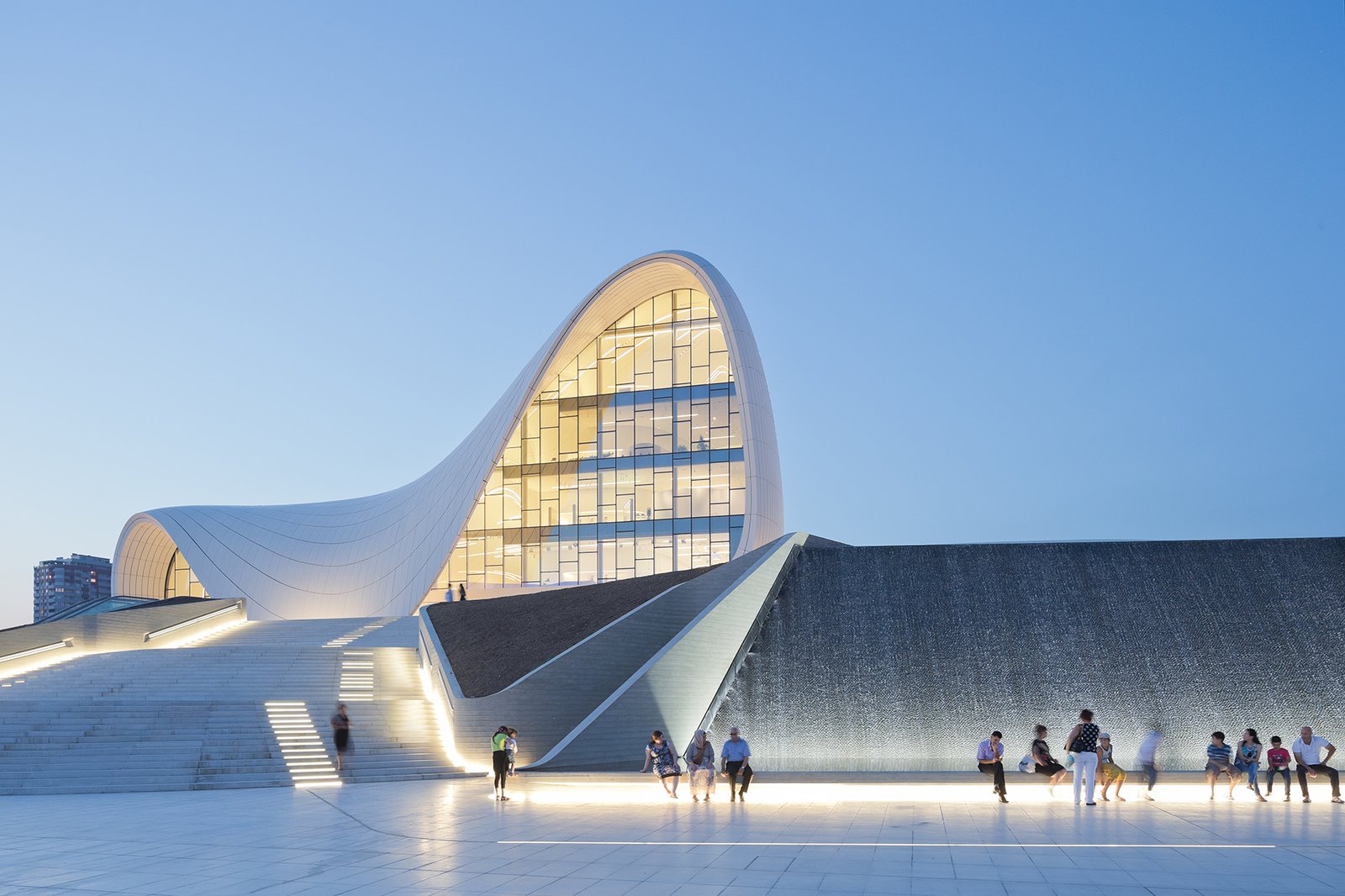
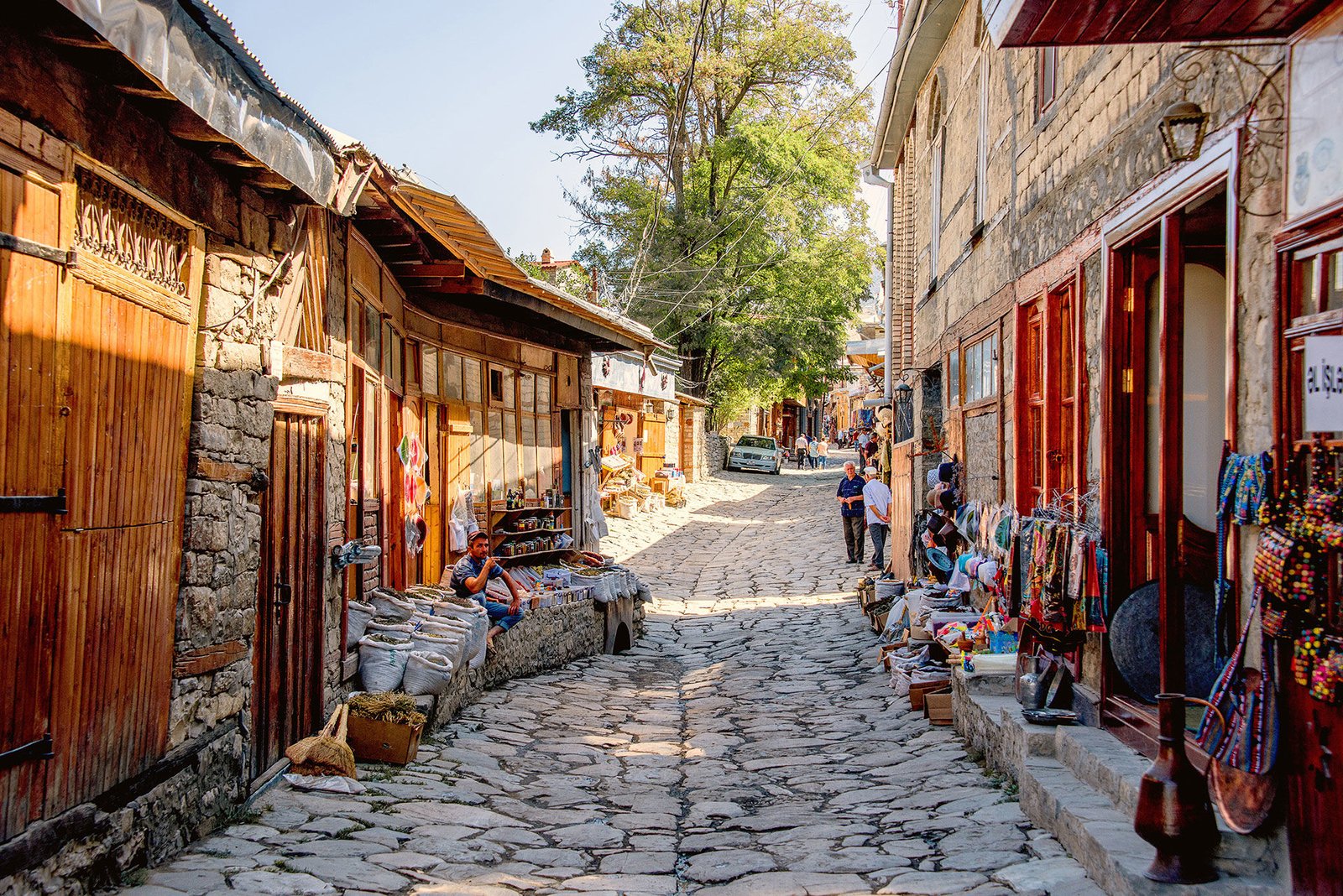




.jpg)

